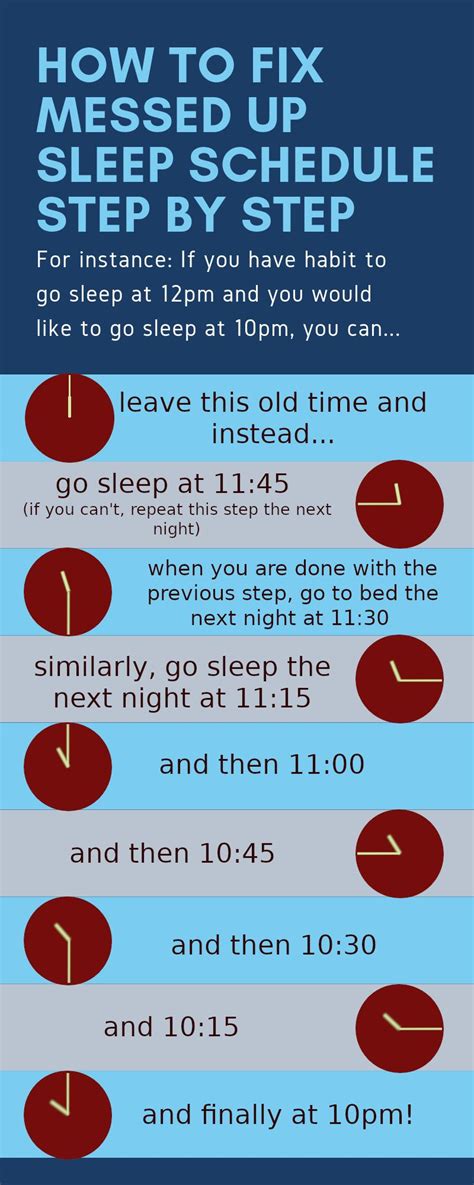How to Fix Your Sleep Schedule: A Guide to Better Rest
Are you struggling with inconsistent sleep? Do you find yourself tossing and turning, unable to fall asleep or wake up feeling groggy and unrefreshed? A disrupted sleep schedule can significantly impact your physical and mental health. This comprehensive guide will provide practical strategies to help you fix your sleep schedule and reclaim the restorative power of a good night's sleep.
Understanding Your Sleep-Wake Cycle
Before diving into solutions, it's crucial to understand your body's natural sleep-wake cycle, also known as your circadian rhythm. This internal clock regulates various bodily functions, including sleep. Disrupting this rhythm can lead to insomnia and other sleep problems. Factors like light exposure, meal timing, and physical activity influence your circadian rhythm.
Identifying Sleep Problems
Before you can fix your sleep schedule, you need to identify the root cause of your sleep problems. Are you struggling with:
- Insomnia: Difficulty falling asleep, staying asleep, or both.
- Delayed Sleep Phase Syndrome: A persistent difficulty falling asleep and waking up at desired times.
- Advance Sleep Phase Syndrome: A tendency to fall asleep and wake up very early.
- Sleep Apnea: Brief pauses in breathing during sleep.
- Restless Legs Syndrome: An overwhelming urge to move your legs, especially at night.
Identifying the specific problem will help you tailor your approach to fixing your sleep schedule.
Strategies for Fixing Your Sleep Schedule
Implementing these strategies consistently is key to success. Remember, it takes time and patience to reset your body's natural sleep rhythm.
1. Establish a Consistent Sleep-Wake Schedule
Consistency is paramount. Go to bed and wake up around the same time every day, even on weekends. This helps regulate your circadian rhythm. Aim for 7-9 hours of sleep per night, depending on your individual needs.
2. Optimize Your Sleep Environment
Create a sleep sanctuary that promotes relaxation and sleep. This includes:
- Darkness: Make your bedroom as dark as possible. Use blackout curtains or an eye mask.
- Quiet: Minimize noise distractions. Use earplugs if necessary.
- Temperature: Maintain a cool room temperature (around 65 degrees Fahrenheit).
- Comfort: Invest in a comfortable mattress, pillows, and bedding.
3. Wind Down Before Bed
Avoid screen time (phones, tablets, computers) at least an hour before bed. The blue light emitted from these devices interferes with melatonin production, a hormone that regulates sleep. Instead, engage in relaxing activities such as:
- Reading a book: Choose a physical book over an e-reader.
- Taking a warm bath or shower: The drop in body temperature afterward can promote sleep.
- Listening to calming music: Choose instrumental music or nature sounds.
- Practicing mindfulness or meditation: These techniques can help reduce stress and anxiety.
4. Regular Exercise
Regular physical activity can significantly improve sleep quality. However, avoid intense workouts close to bedtime. Aim for at least 30 minutes of moderate-intensity exercise most days of the week.
5. Diet and Hydration
Avoid caffeine and alcohol before bed. These substances can interfere with sleep. Also, avoid large meals close to bedtime. Stay hydrated throughout the day, but limit fluid intake before sleep to avoid nighttime bathroom trips.
6. Sunlight Exposure
Get sufficient sunlight exposure during the day, especially in the morning. This helps regulate your circadian rhythm. A morning walk can be beneficial.
7. Seek Professional Help
If you've tried these strategies and are still struggling with sleep problems, consult a doctor or sleep specialist. They can help diagnose underlying sleep disorders and recommend appropriate treatment.
Maintaining a Healthy Sleep Schedule
Fixing your sleep schedule is a journey, not a destination. Once you’ve established a healthy sleep pattern, continue to prioritize the habits outlined above to maintain your progress. Remember that consistency is key to long-term sleep success. By following these tips, you can improve your sleep quality, enhance your overall well-being, and wake up feeling refreshed and ready to conquer your day.
